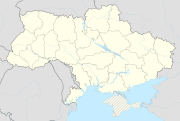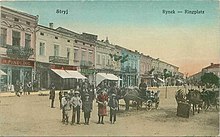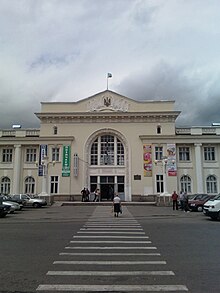Stryj
| Stryj | ||
| Стрий | ||

|
|
|
| Basic data | ||
|---|---|---|
| Oblast : | Lviv Oblast | |
| Rajon : | District-free city | |
| Height : | 296 m | |
| Area : | 15.00 km² | |
| Residents : | 59,488 (2019) | |
| Population density : | 3,966 inhabitants per km² | |
| Postcodes : | 82419 | |
| Area code : | +380 3245 | |
| Geographic location : | 49 ° 15 ' N , 23 ° 51' E | |
| KOATUU : | 4611200000 | |
| Administrative structure : | 1 city | |
| Mayor : | Roman Schramowjat | |
| Address: | вул. Шевченка 71 82400 м. Стрий |
|
| Website : | http://stryi-rada.gov.ua/ | |
| Statistical information | ||
|
|
||
Stryj ( Ukrainian Стрий , Russian Стрый , Polish Stryj ) is a city in the Lviv Oblast in Ukraine with around 60,000 inhabitants (2019). It is located on the Stryj River and is the administrative center of the Stryj Rajon , but not part of it.
history
In 1431 Władysław II Jagiełło of Poland gave Stryj city rights. In the 15th and 16th centuries, Stryj was a flourishing trading town. 1569–1772, the Przemyśler Land was part of the Ruthenian Voivodeship, an administrative division of the Polish-Lithuanian aristocratic republic with the capital Lviv and the state parliament in Sądowa Wisznia , which from 1772 to 1918 formed part of the Austrian crown land Kingdom of Galicia and Lodomeria , with the capital Lviv.
Until 1919, the city essentially shared the history of (Eastern) Galicia , see History of Galicia . In 1850 the city became the seat of the district administration Stryj , in 1867 a district court was set up, both existed until 1918. From 1919 to 1939 the city was a part of Poland and from 1921 it was part of the Stanislau voivodeship . (see main article: History of Poland, Second Republic ).
In the course of the Soviet occupation of eastern Poland , it fell to the Soviet Union in 1939 .
After the attack on the Soviet Union in 1941, the Wehrmacht marched in and began rounding up the Jewish population and deporting them to the extermination camps. During the Second World War , over 4,000 Jewish residents were murdered by the Germans. Karl Klarmann, Police Chief of the German Occupation, was sentenced in 1954 by the Hamburg Regional Court to four years and six months in prison.
After the war, German prisoners of war had to do forced labor in Stryj . In the city there was a POW camp 232 for German prisoners of war of the Second World War. Seriously ill people were cared for in the prisoner-of-war hospital in 5998 .
In 1945 the city with the eastern areas of Poland came to the Soviet Union , see main article: History of Ukraine .
economy
traffic
Stryj is an important railway and transport hub in the Sub-Carpathian region.
It is located on the main connection from Lviv over the Carpathian Mountains to the Transcarpathian Oblast and on to Hungary and Slovakia .
- Railway line Lemberg – Mukacheve – Chop (and on to Budapest )
- Expressway E 50 / M 06 Lemberg – Mukatschewe
such as
- Sambir - Ivano-Frankivsk railway line
Companies
The German company Leoni AG from Nuremberg , as well as the company Time & Space, run a plant near Stryj for the assembly of cable harnesses for cars and other electrical goods.
Culture
literature
In the war story Der Zug was punctlich published in 1949, Heinrich Böll lets his protagonist, the Wehrmacht soldier Andreas, die in a partisan attack "shortly before Stryj". The story was initially entitled Between Lemberg and Czernowitz; the title was changed at the request of the Middelhauve publishing house, which Heinrich Böll later regretted.
Town twinning
There is a city partnership with Düren .
sons and daughters of the town
- Artur Grottger (1837–1867), Polish painter and draftsman
- Efraim Frisch (1873–1942), German writer
- Henrik Galeen (1881–1949), German screenwriter, director and film actor
- Kornel Makuszyński (1884–1953), Polish poet, theater critic and writer
- Kazimierz Wierzyński-Wirstlein (1894–1969), Polish poet
- Józef Koffler (1896–1944), Polish composer and musicologist
- Kazimierz Nowak (1897–1937), Polish globetrotter, hiker, photographer and correspondent
- Zygmunt Wojciechowski (1900–1955), Polish historian
- Julian Stryjkowski (1905–1996), Polish socialist journalist and writer
- Lew Rebet (1912–1957), politician, publicist and lawyer
- Basil Filevich (1918–2006), Ukrainian-Canadian bishop
- Laryssa Kruschelnyzka (1928–2017), prehistorian and librarian
- Solomon J. Buchsbaum (1929–1993), Polish-American physicist
- Zbigniew Messner (1929–2014), Polish economist and politician
- Michele Jamiolkowski (* 1932), Polish-born Italian civil engineer specializing in geotechnical engineering
- Louis Begley (* 1933), American-Jewish writer
- Ihor Tenjuch (* 1958), admiral and politician
- Svyatoslaw Shevchuk (* 1970), Grand Archbishop of Kiev-Halych of the Ukrainian Greek Catholic Church
- Roman Romantschuk (1979-2016), Russian amateur boxer of Ukrainian origin
- Marija Musytschuk (* 1992), chess player
literature
- Verena Dohrn : Journey to Galicia . S. Fischer, 1991, ISBN 3-10-015310-3 .
- Ulrich Schmidt: I admit that I heard . Mandelbaum, Vienna 2013.
Web links
- Stryj . In: Filip Sulimierski, Władysław Walewski (eds.): Słownik geograficzny Królestwa Polskiego i innych krajów słowiańskich . tape 11 : Sochaczew – Szlubowska Wola . Walewskiego, Warsaw 1890, p. 429 (Polish, edu.pl ).
- Leoni AG location
Individual evidence
- ↑ Cities and Settlements of Ukraine on pop-stat.mashke.org ; accessed on June 12, 2020
- ^ Reichsgesetzblatt of October 8, 1850, No. 383, page 1741
- ^ LG Hamburg, March 16, 1954 . In: Justice and Nazi crimes . Collection of German criminal judgments for Nazi homicide crimes 1945–1966, Vol. XII, edited by Adelheid L Rüter-Ehlermann, HH Fuchs and CF Rüter . Amsterdam: University Press, 1974, No. 395, pp. 305-322
- ↑ Maschke, Erich (ed.): On the history of the German prisoners of war of the Second World War. Verlag Ernst and Werner Gieseking, Bielefeld 1962–1977.
- ↑ See: Werner Bellmann : Heinrich Böll's first book publication "The train was punctual". On printing history, text development and commentary . In: Wirkendes Wort 65 (2015) Heft 1, pp. 87-104, here pp. 87 and 100.





